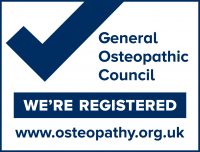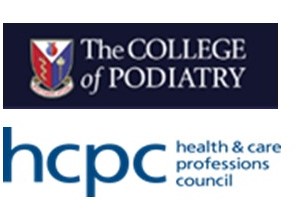Podiatry
Podiatry involves the assessment, diagnosis and treatment of conditions related to the foot, ankle, lower limb and its associated structures. It encompasses both conservative care for existing complaints, and corrective management for acute and chronic conditions.

About Podiatry
Podiatry used to be called Chiropody, in 1993 all suitably qualified practitioners became Podiatrists. Our practitioners are members of the College of Podiatry which regulates the profession and upholds standards.
Their professional and comprehensive training as well as their experience both privately and within the NHS enables our Podiatrists to be the foremost experts on the health of the foot, ankle and lower limb.
They prevent and correct deformity, keep people active, relieve pain and treat infections. They can give you and your family advice on how to look after your feet and what type of shoes to wear.
Feet do a lot of work. By the time you are 50, you will have walked 75,000 miles on them. They are complex structures with many bones, tendons, and ligaments that have to work together perfectly to keep you moving.
By looking after feet our Podiatrist’s improve and sustain the mobility, independence and quality of life for their patients.
What a Podiatrist Treats
Calluses/Corns
Corns are a build-up of hard skin near a bony area of a toe or between toes. Corns may be caused by pressure from shoes that rub against the toes or cause friction between the toes. A callus is a build-up of hard skin, usually on the underside of the foot.
Fungal Infections
Toenails can be affected by fungal organisms, more commonly as we get older, they discolour the nail and can cause problems. Other infections, such as Athletes Foot, can be caused by the feet being left damp or picked up from changing room floors.
Nail Cutting/Hard Skin Removal
Correct nail cutting becomes hugely important as we get older, to stop the nail jagging the toe and causing a sore or infection. Removing hard skin regularly increases comfort and reduces the possibility of developing Corns or Calluses.
Verrucae
Or ‘Plantar Warts’ are a viral infection that is mostly harmless but can be uncomfortable. There are many treatments, provided by our specialist Amee Patel, as discussed below.
Ingrown Toenails
Occur when the edges or corners of your nails grow into the skin next to the nail. Your big toe is most likely to get an ingrown toenail. They can be incredibly painful and debilitating and sometimes need minor surgery to resolve.
Bunions
A bunion is a bony bump that forms on the joint at the base of your big toe. It occurs when some of the bones in the front part of your foot move out of place, usually as a result of wearing the wrong shoes or changes to the shape of your foot.
Nail Surgery/Nail Reconstruction
Nail surgery is sometimes needed for ingrowing toenails and nail reconstruction involves a specialist gel that is layered on top of unsightly or misshapen nails so that the nail is more aesthetically pleasing, often used following nail surgery.
Morton’s neuroma
Morton’s neuroma is a painful condition that affects the ball of your foot, most commonly the area between your third and fourth toes. Morton’s neuroma may feel as if you are standing on a pebble in your shoe or on a fold in your sock.
Biomechanics
Is the study of the structure of the foot and its changes through use. Our Podiatrists are able to diagnose, advise and recommend ready-made Orthotics if necessary.
Diabetic Care
People who suffer from diabetes need to take extra care to protect their feet from infection. They can have a condition called peripheral neuropathy that makes them unaware of damage and makes healing slower.
Wound Dressings
Foot or leg injuries in the elderly can take time to heal and benefit hugely from proper dressing, our Podiatrist Ayma has particular expertise in this area.
Pain/Soreness
Can be the result of poor footwear, injury, hard skin, poor gate or even referred pain. Our Podiatrists can diagnose and give advice.
What our customers say
“I have been visiting Helen for nearly fifteen years which involves a round trip of 35 miles each time. I am prepared to do this because Helen is an expert in her field, she offers a professional, yet caring and relaxed service combined with a passion for her vocation. I have no hesitation in recommending Helen and would travel further if necessary, to get such a complete service.”
“I have been visiting Aimee for many years. I have nothing but good thing to say as she has been able to deal with my many conditions. She has always been professional & friendly. Would highly recommend her.”
“Helen is professional, friendly and attentive. After a treatment my feet are much improved and comfortable.”
“I`ve been seeing Amee for 7 years. I have always found the treatment and advice from Amee excellent. Her care is first class! I always leave my appointments happy, comfortable and looking forward to my next visit. With Amee`s vast experience, I felt happy to bring my daughter in for her verruca treatment.”
Our Podiatrists
Are all HCPC registered and hugely experienced.
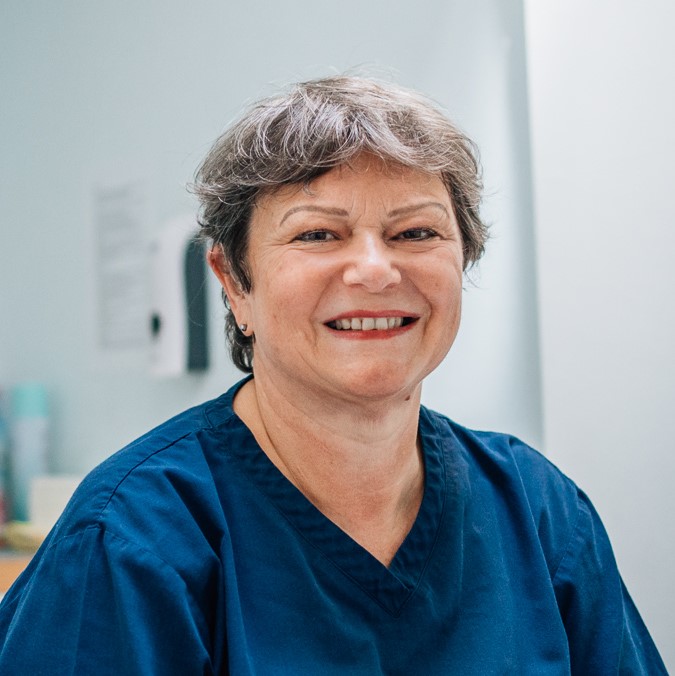
Helen Wells
Helen wells SRCh DPod M MChs
Helen has 35 years’ experience in all aspects of foot care, both the NHS and privately, and is HCPC registered. She is a general Podiatrist with huge experience and great skill, and our lead Podiatrist at PONHC. Extremely thorough, Helen likes to understand the problem fully and find a way of explaining her diagnosis to the patient. She likes to make the patient feel safe and at ease, and to leave them with comfortable feet, enjoying their relief from pain. She is particularly adept at working with the nervous patient.
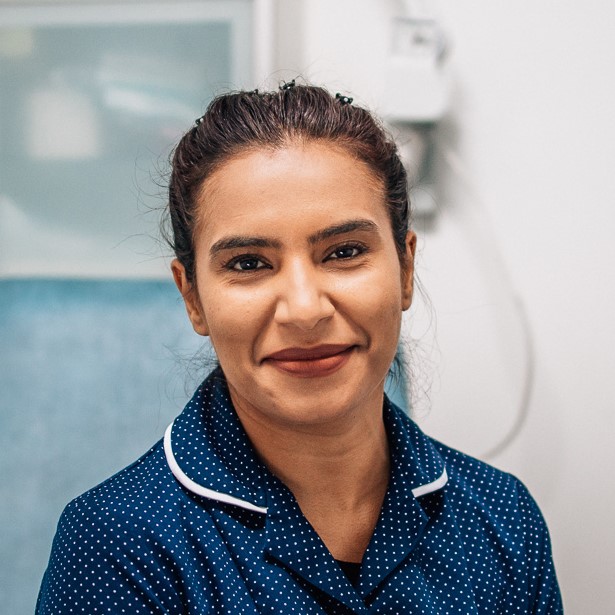
Ayma Fisher
BSc(Hons) MChs
Ayma takes great care of her patients, getting to know them and understand their particular needs. Like all our Podiatrists, she is capable in all areas of general Podiatry, but she has particularly extensive experience with wound care associated with Diabetes. She also performs nail surgery and is trained in Biomechanical assessment and diagnosis. Ayma is able to recommend over-the-counter insoles or solutions where possible or refer onwards to MSK or orthopaedic specialists if the problem is too severe to be treated within our Podiatry department.
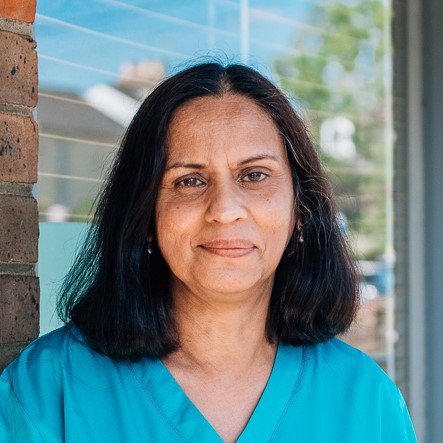
Amee Patel
SRCh DPodM MChs
Amee is an extremely dedicated and caring practitioner who after 30 years in practice has extensive knowledge and expertise in all aspects of general Podiatry. She has particular specialisms in the treatment of verrucae and ingrown toenails. (See below for more details of the Verrucae treatments). Additionally, Amee is able to carry out nail reconstruction for nail deformities or fungal nails to cover the discoloration and deformity, she also offers treatment for fungal infections and advice on fungal nails which may need oral medication from the GP.
Verrucae
A verruca is simply a wart that is found on the sole of your feet. They can also appear around the toes. Verrucae are slightly raised and circular in shape, with a thickened rim of surrounding skin. The surface may have black dots (‘pepper-pot’ appearance). There may be several verrucae or just one. It may become rough and bumpy with a cauliflower-like appearance.
They are caused by the Human Papilloma Virus (HPV). This virus is contagious but can only be caught by direct contact. It thrives in warm, moist environments such as swimming pools, changing room floors and bathrooms.
Most verrucae are harmless, but they can be very uncomfortable if they are on the part of the foot where you bear weight. Our Podiatrist Amee Patel has huge experience in working with verrucae, offering three types of treatment. Acid treatment, Vertical Needling (under local Anaesthetic) and Microwave Therapy by ‘Swift’, which is the latest innovation in the field.


In-growing Toenails
Ingrown toenails are a common condition in which the corner or side of a toenail grows into the soft flesh. The result is pain, redness, swelling and, sometimes, an infection. Ingrown toenails usually affect your big toe.
If the pain is severe or spreading, your Podiatrist can take steps to relieve your discomfort and help you avoid the complications of ingrown toenails. If you have diabetes or another condition that causes poor blood flow to your feet, you’re at greater risk of complications and should seek help.
Common causes of ingrowing toenails include wearing shoes that crowd your toenails, cutting them too short or not straight across, injuring your toenail or having unusually curved toenails.
We can advise on prevention, but if the nail does become a problem, our Podiatrists are experienced in management of the nail and if necessary, nail surgery and reconstruction.
Dressings
Wound dressing is a particular skill, all wounds can be helped by appropriate dressing and made worse by incorrect dressing. As we get older, or if we have diabetes, foot or leg injuries can take time to heal and their proper care is vital.
Most commonly dressings are needed for Diabetic ulcerations. These need correctly debriding and de-sloughing before the appropriate dressing is applied. The correct treatment is vital in allowing the tissue to heal and avoiding the need for more radical treatment such as amputation.
Our Podiatrist Ayma Fisher works has worked in specialist Podiatric departments in the NHS, working with wound management, and can give good advice as well as tend and dress your wounds.




